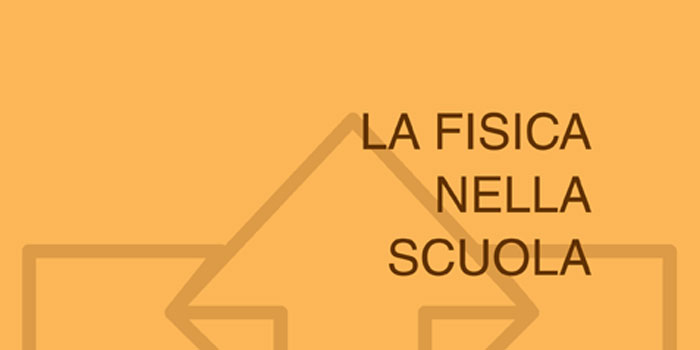Articoli rivista
Cultura
 Anno XXXI - n.1 - gennaio/marzo 1998
Anno XXXI - n.1 - gennaio/marzo 1998 Il quaderno di appunti zurighese di Einstein e la scoperta delle equazioni del campo della gravitazione nell’anno 1912
Einstein worked eight years (from 1907 to 1915) to obtain an extension of special relativity to accelerated frames and to develop a relativistic theory of gravitation. Although the field equations of the theory of general relativity appeared at the end as a full realization of the heuristic assumptions he had formulated at an early stage of his investigations, […]
 Anno XXV - n.4 - ottobre/dicembre 1992
Anno XXV - n.4 - ottobre/dicembre 1992 Immagini del sapere e formazione scientifica
This article discusses what conceptions of knowledge are basic to the performance of scientific activities. It explores the complexity of the processes by which scientific knowledge is built and their relationship with the affective domain and with common sense knowledge. It examines the implications of a totally constructivist perspective on science learning, […]
 Anno XXXII - n.4 - ottobre/dicembre 1999
Anno XXXII - n.4 - ottobre/dicembre 1999 Insegnare fisica per nuclei fondanti: un esempio riferito al concetto di spazio
The paper presents a study aimed at constructing a “physics for teaching”. The study concerns an analysis of the physical contents of spacetime theories carried out from the perspective of designing conceptual paths moving from classical mechanics to general relativity. An example of paths is presented and their main features are pointed out. […]
 Anno XLVII - n.4 - ottobre/dicembre 2014
Anno XLVII - n.4 - ottobre/dicembre 2014 “Io dico l’universo” (Parlare a scuola dell’evoluzione stellare)
The following contribution to the last AIF’s Congress outlines a concise didactic excursus on stellar evolution suitable for secondary school students. The proposal, following Galileo’s suggestion about the “book of the Universe”, invites to get the relevance of the study about the origins and of an evolutive process resulting in our very existence. […]
 Anno XLVI - n.3 - luglio/settembre 2013
Anno XLVI - n.3 - luglio/settembre 2013 Joseph Louis Lagrange a duecento anni dalla morte
The Piedmontese mathematician Joseph Louis Lagrange died in Paris 200 years ago. His interesting life and his scientific achievements are recalled and described […]
 Anno XXIII - n.3 - luglio/settembre 1990
Anno XXIII - n.3 - luglio/settembre 1990 L’astronomia: un’applicazione della fisica
Newtonian gravitational laws explain the motions of planets around the Sun and the motions of double stars around their center of mass. Small deviations from the predictions of these laws have given confirmation of the general relativity theory. Astrophysics, by means of the analysis of the electromagnetic radiation emitted by the celestial bodies permits us to derive the surface temperature of stars, […]
 Anno XXXII - n.3 - luglio/settembre 1999
Anno XXXII - n.3 - luglio/settembre 1999 L’educazione alla conoscenza scientifica: un percorso che parte da lontano
This paper aims at clarifying what education in science may mean in the real context of classroom activities. In particular the meaning of education in physics will be illustrated by looking at the development of concepts and methods within a perspective of continuity in the teaching of science at the level of compulsory education, […]
 Anno XXIX - n.1 - gennaio/marzo 1996
Anno XXIX - n.1 - gennaio/marzo 1996 L’entropia tra disordine e ignoranza. Nascita e sviluppo della prospettiva informazionale in fisica
At the turn of the century, a new approach to science gradually emerged. In this “information approach”, science is not a description of world in itself, but a coding of the information scientists have about the world. This approach was born inside statistical mechanics from the effort of giving a microscopic interpretation of entropy. […]
 Anno XXVIII - n.4 - ottobre/dicembre 1995
Anno XXVIII - n.4 - ottobre/dicembre 1995 L’esperimento delle due fenditure nella comprensione della meccanica quantistica
Different versions of the two slits experiment are investigated, pointing out the peculiar difficulties of its didactic presentation, and the conceptual misunderstandings that a superficial reading of the experience can lead to. […]